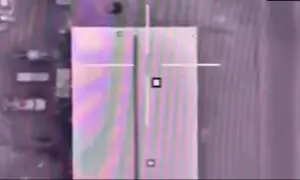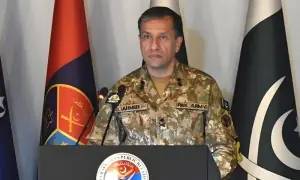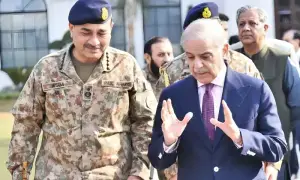The flying hospital bringing Ukraine’s wounded west
4 min readON BOARD A BOEING 737 MEDEVAC PLANE: You can see the pain held just in check in the faces of Ukraine’s war wounded as they are evacuated in a flying hospital.
“It’s the first time I’ve taken a plane,” says 22-year-old Mykola Fedirko, who was hit by a shell holding off Russian troops in a trench in the Donetsk region.
“I would have loved to be going to Denmark for a holiday and not to hospital because of my wound,” says the 22-year-old salesman-turned-soldier, whose lower leg is held in place by metal pins.
Fedirko is one of around 2,000 wounded who have been evacuated from Ukraine to hospitals across Europe since the war started more than a year ago.
Most have been injured in fighting, but some are critically ill civilians.
AFP is the first international media outlet allowed on one of the medical evacuation (medevac) flights carried out by Norway in collaboration with the European Union in a specially adapted Boeing 737.
“We established this scheme at the request of Ukraine… to alleviate the burden on the Ukrainian hospitals,” says Juan Escalante of the EU’s Emergency Response Coordination Centre.
The project is “unprecedented at the continental level” and was set up “in record time”, he adds.
Some 859 health facilities in Ukraine have been attacked since the Russian invasion, according to the World Health Organization.
Bombings of hospitals, maternity wards and medical storage units mean almost half a million people a month are deprived of medical care, the Norwegian authorities estimate.
Wounded and weapons cross
The flying hospital, a transformed passenger plane owned by Scandinavian carrier SAS, lands at Rzeszow airport in southeastern Poland, 70 kilometres (44 miles) from the Ukrainian border, to pick up the injured before flying them over two days to Amsterdam, Copenhagen, Berlin, Cologne and Oslo.
A hub for delivering arms to Ukraine, Rzeszow airport has dozens of anti-air missiles and several large cargo aircraft unloading pallets of ammunition just a few feet away from where the war wounded are loaded onto the medevac plane.
The crew of the medevac flight are civilians but the medical staff are from the Norwegian military.
In an odd semblance of normality, a stewardess hands out pizzas, snacks and soft drinks.
Oleksiy Radzyvil, 28, who has injuries to both legs, devours his Margherita pizza and washes it down with a Coke.
With his wild mane and perpetual smile, Radyzvil sticks out in the grim surroundings.
He was even smiling in December when he regained consciousness after a Russian shell destroyed his vehicle, sending him several metres into the air in Bakhmut, the epicentre of fighting in eastern Ukraine.
“I smiled because I was alive,” he recalls.
Since then, he’s been treated in six hospitals in Ukraine.
‘Fight against Putin’
In Europe, the patient transfers are seen as a way of helping the war effort.
They are “another way to fight against Putin”, Spanish Defence Minister Margarita Robles said as she visited a military hospital in Zaragoza last year.
The modified Boeing is equipped with 20 hospital beds, monitors, ventilators, blood transfusion equipment and countless vials of antibiotics.
It’s “like a small intensive care unit in the air”, says Hakon Asak, a lieutenant-colonel from the Norwegian military’s medical service.
“We’ve had no deaths onboard so far. Thank God for that,” he adds, a blue-and-yellow “Free Ukraine” bracelet looped around his wrist.
Most of the patients may look well, he says, “but they are still in severe condition, and we know that some who have been medevaced to different countries have not survived.”
Suffering children
In the cockpit of the plane is Arve Thomassen, a seasoned veteran.
In his previous career at the twilight of the Cold War, Thomassen was a fighter pilot intercepting Soviet planes in the Arctic.
Now aged 60, this larger-than-life Norwegian says he was happy to wrap up his career with a good cause.
“When you fly passengers down to the Mediterranean for sunbathing that’s normal business. I wouldn’t say boring but it’s very common,” he says.
But with these flights, “we take pride in doing this and we do it with a very humble attitude,” he adds.
They will never forget some of the people they’ve transported: the severe burn victims; the man so disfigured he looked like he’d come from the World War I trenches, or the three-year-old suffering from leukaemia.
“It’s one thing to have wounded soldiers but children who suffer that always makes a strong impression on people,” Thomassen tells AFP.
For some passengers, a nap provides a few minutes of respite from the pain.
But Vladyslav Shakhov can’t sleep.
US backs special tribunal on Russia ‘aggression’ against Ukraine
The 24-year-old was hit by shrapnel in the back of the neck and now suffers from quadriparesis – muscle weakness in all four limbs.
“I’m not happy about leaving my country,” says entrepreneur-turned-armoured car driver, who is heading to Germany.
“I hope they will get me back on my feet quickly so I can get back.”
For the latest news, follow us on Twitter @Aaj_Urdu. We are also on Facebook, Instagram and YouTube.


























Comments are closed on this story.